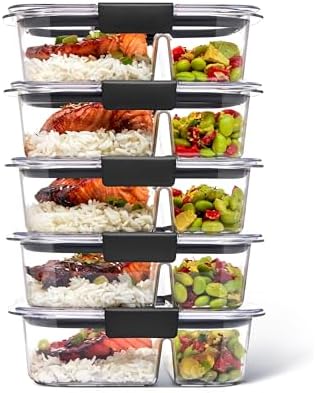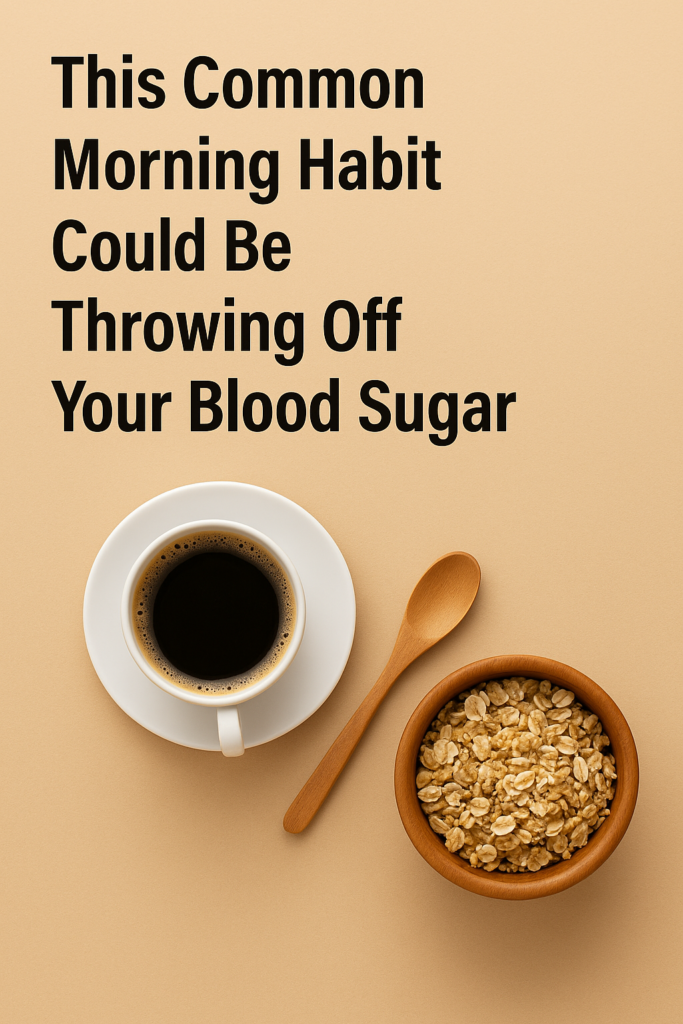
When you think of blood sugar problems, you might picture sugary desserts or heavy dinners.
But what if the real culprit starts first thing in the morning?
Believe it or not, your blood sugar levels can spike — or crash — based on simple habits you follow within the first hour of waking up.
Let’s dive into what many people are doing wrong, why it matters for your energy and long-term health, and how you can fix it easily.
🕰️ The Morning Habit That’s Secretly Spiking Your Blood Sugar
Waking up and immediately reaching for a cup of coffee is a ritual for millions of people around the world.
It feels comforting, energizing, and almost necessary to “kickstart” the day.
However, drinking coffee on an empty stomach could be wreaking havoc on your blood sugar levels without you even realizing it.
When you consume caffeine before eating any food, it triggers your adrenal glands to release cortisol, the stress hormone.
Cortisol is naturally highest in the morning, but caffeine can amplify its effect dramatically.
Elevated cortisol pushes your liver to release more stored glucose into the bloodstream, leading to a sudden spike in blood sugar.
If there’s no food to slow the absorption, your blood sugar levels can rise quickly and crash just as fast, setting you up for cravings, mood swings, and fatigue later in the day.
Let’s break down exactly why this happens — and how you can easily avoid it.
☕ Why Coffee on an Empty Stomach Disrupts Blood Sugar
Coffee contains compounds that increase insulin resistance temporarily.
This means your cells don’t respond as well to insulin, and your body struggles to pull sugar out of the blood and into the cells where it belongs.
Research shows that caffeine can reduce insulin sensitivity by up to 15% (Source: Diabetes Care Journal.)
This impaired insulin response worsens when caffeine is consumed without food.
Your body interprets it as a “stress signal,” leading to greater fluctuations in blood sugar throughout the morning.
If you find yourself feeling wired, jittery, or extremely hungry an hour after coffee, this could be exactly why.
Long term, this habit strains your pancreas and increases your risk of metabolic issues, even if you’re otherwise healthy.
🔄 What Happens to Your Blood Sugar After Coffee Alone
Here’s the typical pattern when coffee is consumed before breakfast:
- Step 1: Cortisol surges higher than normal.
- Step 2: Stored glucose is released into the blood.
- Step 3: Blood sugar rises sharply.
- Step 4: Insulin is secreted to lower blood sugar.
- Step 5: Blood sugar dips too low (reactive hypoglycemia).
- Step 6: You crave quick carbs or more caffeine for an energy boost.
This roller coaster effect isn’t just tiring — it damages your metabolic resilience over time.
You may notice that you’re “starving” by mid-morning or need multiple cups of coffee to stay awake because of this hidden blood sugar sabotage.
🛡️ How to Break the Cycle and Protect Your Blood Sugar
The good news is you don’t have to give up coffee — you just have to change when and how you drink it.
Prioritizing a small, protein-rich breakfast before caffeine can significantly stabilize blood sugar responses.
Something as simple as a boiled egg, a slice of avocado toast, or a protein smoothie can blunt cortisol and prevent the blood sugar surge.
You can also add cinnamon to your coffee, which has been shown to help regulate blood sugar (Source: Journal of Diabetes Science and Technology).
Choosing a coffee maker that allows for programmable brew times can make your morning less rushed, giving you time to eat first without skipping your caffeine fix.
Another tip is using a smart mug that keeps your coffee hot for hours, so you don’t feel pressured to drink it before you’re ready.
🛒 Helpful Picks for Smarter Mornings
Programmable Coffee Maker: A simple programmable coffee machine lets you schedule your brew so your breakfast and coffee timing work perfectly together.
Smart Coffee Mug: A temperature-controlled mug keeps your coffee warm for hours, making it easier to delay your first sip until after breakfast.
Protein Smoothie Booster: A high-quality unflavored protein powder can be added to morning smoothies, offering a quick and convenient way to support your blood sugar.
📚 What Research Says About Coffee and Blood Sugar
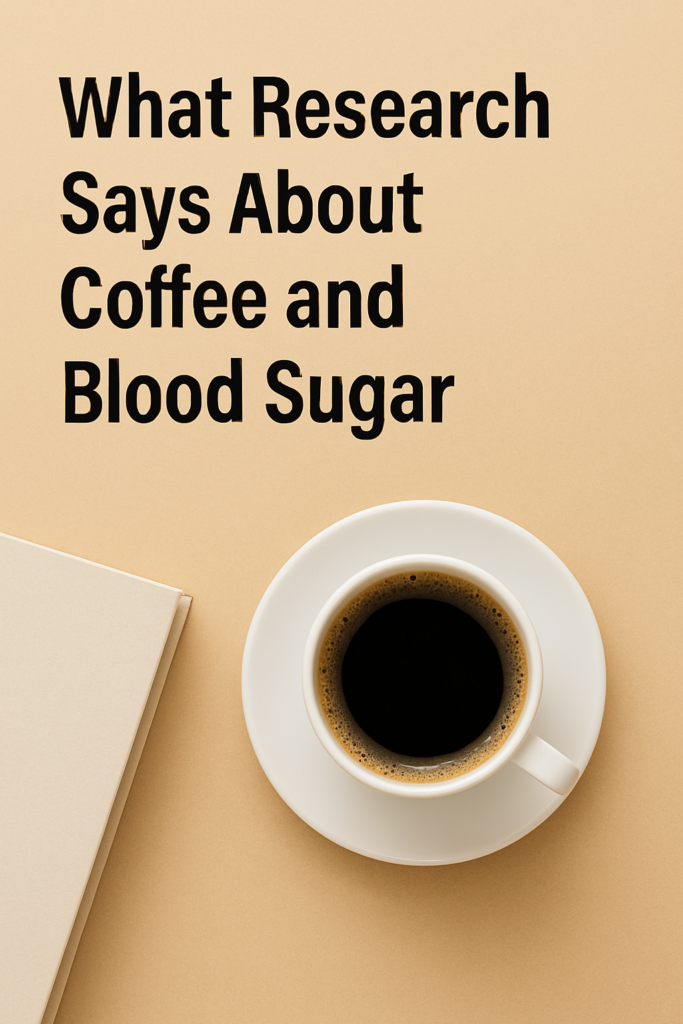
While many people view coffee as a harmless — even healthy — morning ritual, scientific research paints a more complicated picture when it comes to blood sugar.
Over the past two decades, numerous studies have explored how caffeine, and specifically coffee consumption, impacts glucose metabolism and insulin sensitivity.
The results consistently show that the timing and context in which you drink coffee dramatically influence your blood sugar response.
Let’s take a closer look at some of the most important findings.
🧪 Coffee Before Breakfast Impairs Blood Sugar Control
A landmark 2020 study conducted by the University of Bath in the UK revealed surprising insights.
Researchers found that drinking strong black coffee before eating breakfast increased participants’ post-breakfast blood sugar responses by 50% compared to when breakfast was eaten before caffeine (Source: University of Bath Study).
In the study, participants underwent three different conditions:
- A normal night’s sleep followed by a sugary drink.
- A disrupted night’s sleep followed by a sugary drink.
- A disrupted night’s sleep followed by coffee first, then a sugary drink.
Interestingly, while sleep disruption alone had little effect on blood sugar, drinking coffee before eating caused a significant spike.
This suggests that even after a poor night’s sleep, your first priority should be eating — not caffeine — if you want to stabilize your blood sugar.
🔬 How Caffeine Reduces Insulin Sensitivity
Research published in Diabetes Care journal demonstrated that caffeine intake reduced insulin sensitivity by as much as 15% in healthy individuals (Source: Diabetes Care).
When insulin sensitivity drops, your body’s cells struggle to absorb glucose from the bloodstream efficiently.
This causes blood sugar to remain elevated for longer periods, straining your pancreas and setting the stage for inflammation and metabolic issues.
Even in otherwise healthy adults, habitual coffee consumption before food can interfere with normal glucose regulation.
Researchers emphasize that while moderate coffee consumption isn’t inherently harmful, timing matters enormously when it comes to preserving metabolic health.
🧠 Coffee’s Hidden Impact on Hormones and Blood Sugar

Beyond direct effects on glucose, caffeine also stimulates a cascade of hormonal changes that indirectly influence blood sugar.
Caffeine activates the adrenal glands to release cortisol and adrenaline, both of which can signal the liver to release stored glycogen (sugar) into the bloodstream.
This hormonal spike can lead to temporary hyperglycemia (high blood sugar) even if you haven’t eaten anything sugary.
Chronic exposure to this cycle — day after day, coffee after coffee — has been linked to an increased risk of developing insulin resistance, according to The American Journal of Clinical Nutrition (Source).
This risk increases even more for people who are already struggling with conditions like prediabetes, PCOS, or metabolic syndrome.
🛒 Helpful Picks to Support Healthy Coffee Habits
- Blood Sugar-Friendly Sweetener: Swap high-sugar coffee syrups for a natural cinnamon-based sweetener that may help regulate blood sugar naturally.
- Glucose Monitoring Made Easy: If you’re curious about how coffee impacts your personal blood sugar, a continuous glucose monitor can give real-time feedback (ideal for biohackers and health enthusiasts).
- Gentle Wake-Up Tools: Instead of rushing for coffee immediately, try using a sunrise simulation alarm clock to wake your body naturally and lower cortisol spikes.
📚 Key Takeaways from the Research
Scientific studies overwhelmingly agree:
Smart morning strategies can help you enjoy your coffee and protect your blood sugar long term.
Coffee itself is not necessarily the enemy.
Drinking coffee before food can dramatically impair blood sugar control.
Eating a protein-rich breakfast before caffeine is one of the simplest, most powerful ways to stabilize energy, mood, and metabolism.
🍳 Here’s How to Fix It: Simple Morning Shifts to Balance Blood Sugar
Now that we know how easy it is for morning habits to throw off blood sugar, the next step is building a smarter, healthier routine.
The good news?
You don’t have to give up your morning coffee.
You simply need to tweak the order of operations — and choose your first bites and sips more carefully.
With just a few simple shifts, you can support steady blood sugar all day long while still enjoying your favorite rituals.
🥚 1. Eat a Protein-Rich Breakfast First
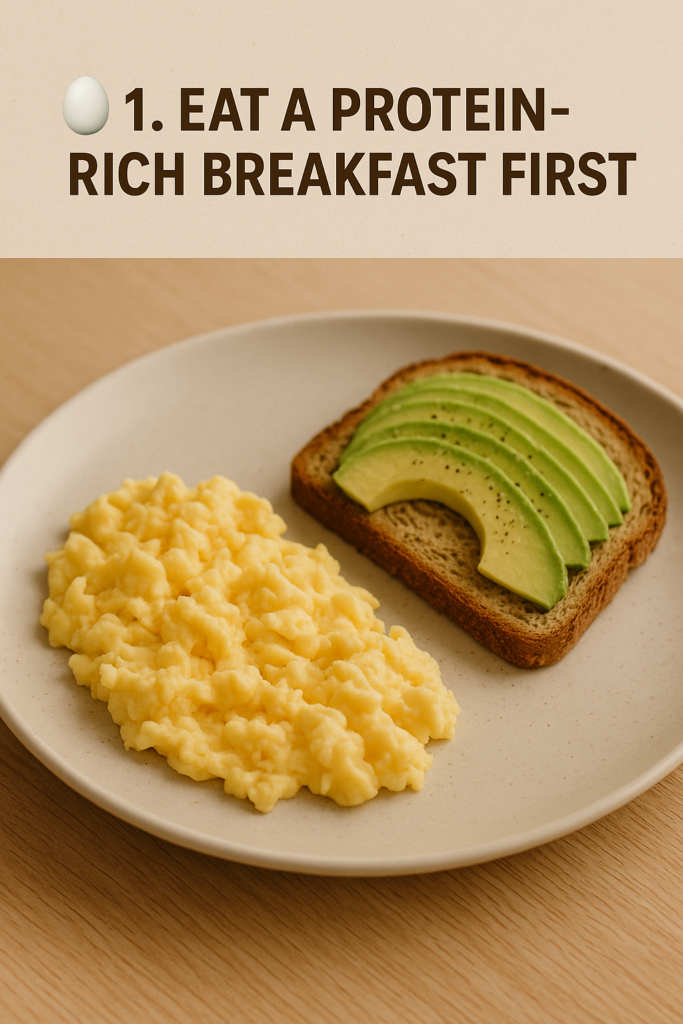
The single most important change you can make is eating protein before caffeine.
Protein slows down digestion, provides essential amino acids, and helps buffer the cortisol spike caused by waking up.
When you eat a protein-forward breakfast, you create a strong metabolic foundation that helps your body manage blood sugar more efficiently.
Some easy high-protein breakfast options include:
- A few scrambled eggs with spinach.
- Greek yogurt with chia seeds and berries.
- A quick protein smoothie with low-glycemic fruits like blueberries.
Even a small amount of protein — around 15–20 grams — can make a huge difference in your body’s ability to handle the caffeine that follows.
⏰ 2. Delay Your Coffee by 30–60 Minutes
Instead of grabbing coffee within minutes of waking up, wait at least 30–60 minutes after you’ve eaten.
This gives your body time to wake up naturally and allows cortisol levels to start stabilizing.
Delaying coffee also helps your gut prepare for better digestion and reduces morning jitters associated with sudden blood sugar spikes.
Use that waiting window to hydrate with water, stretch lightly, or step outside into natural sunlight — which also helps regulate your circadian rhythm.
Over time, this small change can dramatically improve your energy, mood, and appetite control throughout the day.
🌿 3. Add Blood Sugar-Friendly Boosts to Your Coffee

When you finally sip your coffee, a few small additions can make it significantly more blood sugar-friendly.
Adding a sprinkle of cinnamon is one of the easiest and tastiest tricks.
Cinnamon has been shown in multiple studies to improve insulin sensitivity and help regulate blood sugar spikes (Source: Journal of Medicinal Food).
Another simple add-in is collagen peptides.
Collagen adds a small amount of protein to your coffee, helping slow glucose absorption without altering the taste.
Both cinnamon and collagen make your morning cup work for you, not against you.
Helpful picks:
- Organic Ceylon cinnamon powder for easy sprinkling into any hot beverage.
- Unflavored collagen peptides that dissolve instantly into coffee without clumping or flavor changes.
🥤 4. Focus on Hydration First
Another powerful habit is starting your morning with water instead of coffee.
Overnight, your body loses hydration through breathing and metabolism, so drinking water first thing helps replenish lost fluids and supports healthy digestion.
Staying hydrated improves blood sugar regulation by supporting kidney function and enhancing insulin sensitivity.
A pinch of sea salt or a splash of electrolyte solution in your water can further boost hydration and prevent morning fatigue.
This simple act primes your body to better handle both food and caffeine afterward.
Helpful pick:
Electrolyte drink mixes with no added sugars can make hydration more effective and delicious without spiking your blood sugar.
🎯 Quick Morning Routine for Blood Sugar Success
Here’s a quick snapshot of the new, blood sugar-friendly morning flow:
| Step | Action |
|---|---|
| 1 | Drink a large glass of water (bonus if with electrolytes) |
| 2 | Eat a small, protein-rich breakfast |
| 3 | Wait 30–60 minutes after eating |
| 4 | Enjoy your coffee, ideally with cinnamon or collagen added |
By following this simple flow, you’ll notice more consistent energy, fewer cravings, sharper focus, and greater overall well-being — without giving up the rituals you love.
Try this pure collagen powder that dissolves easily in hot or cold drinks.
- Bioavailable: Digested and absorbed by the body quickly for maximum benefits
- Beneficial: Helps improve hair, skin, nails, joints and ligaments, and tendon health
- asy to Use: Soluble in hot or cold liquids, including coffee, smoothies, and baked goods
🩺 Why Blood Sugar Matters Even If You’re “Healthy”
Even if you don’t have diabetes, balancing your blood sugar daily is key to:
- More consistent energy levels
- Better focus and mood
- Reduced cravings
- Healthier weight management
- Slower aging and reduced inflammation
Chronic blood sugar spikes — even small ones — are linked to accelerated aging of blood vessels, brain fog, and hormone imbalance.
(Reference: The New England Journal of Medicine Source)
Small improvements in your morning routine can mean the difference between feeling “blah” and feeling vibrant all day long.
🍽️ Quick Balanced Breakfast Ideas to Support Blood Sugar
Building a blood sugar-friendly morning starts with choosing the right breakfast.
The ideal breakfast is not just about calories — it’s about balancing protein, healthy fats, fiber, and slow-digesting carbohydrates.
This combination helps slow glucose absorption, prevents blood sugar spikes, and keeps your energy levels even for hours.
You don’t need to spend hours cooking to make it happen, either.
Here are easy, realistic breakfast ideas that nourish your body while protecting your blood sugar — even on busy mornings.
🥑 1. Scrambled Eggs with Avocado Toast (on Whole-Grain Bread)
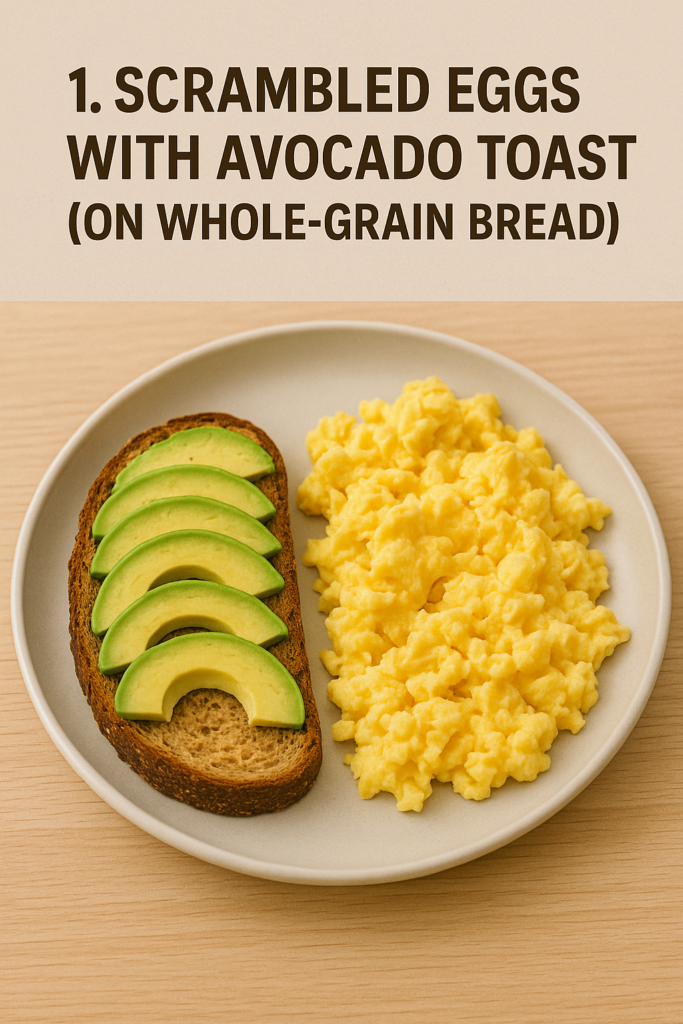
Eggs are a fantastic source of complete protein, offering all nine essential amino acids your body needs.
Scrambling two or three eggs with a handful of spinach provides a filling, nutrient-rich start to your day.
Pair the eggs with a slice of whole-grain or sprouted-grain bread topped with avocado for a dose of heart-healthy fats.
The fiber from the bread and the healthy fat from the avocado slow down digestion, leading to a smoother blood sugar response.
Sprinkle a pinch of sea salt and crushed red pepper on top for extra flavor without added sugars.
Helpful pick:
Sprouted whole-grain bread options are a great pantry staple to have for easy, balanced breakfasts.
🥣 2. Overnight Oats with Chia Seeds and Berries
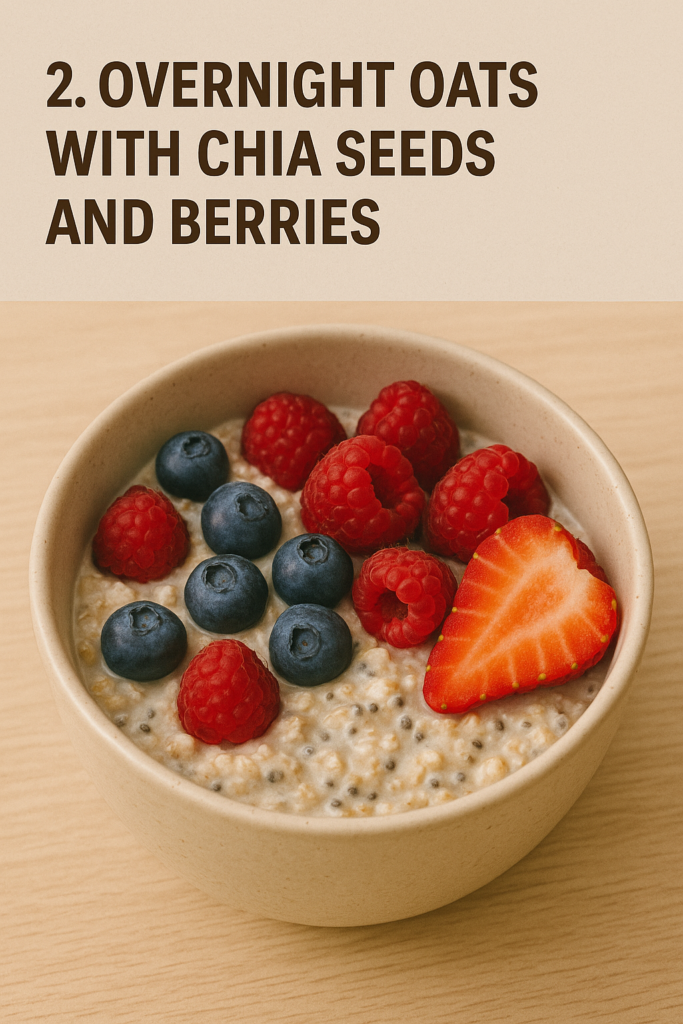
Overnight oats are a life-saver if you want breakfast ready when you wake up.
Use rolled oats soaked in unsweetened almond milk or Greek yogurt for added protein.
Add a tablespoon of chia seeds for extra fiber and omega-3s, both of which help stabilize blood sugar.
Top with a handful of low-glycemic fruits like blueberries or raspberries for natural sweetness without a sugar overload.
You can batch-make several jars at once and have a grab-and-go breakfast ready for the whole week.
Helpful pick:
Glass mason jars with lids make overnight oats easy to prep, store, and transport without spills.
🧀 3. Cottage Cheese with Sliced Peaches and Walnuts
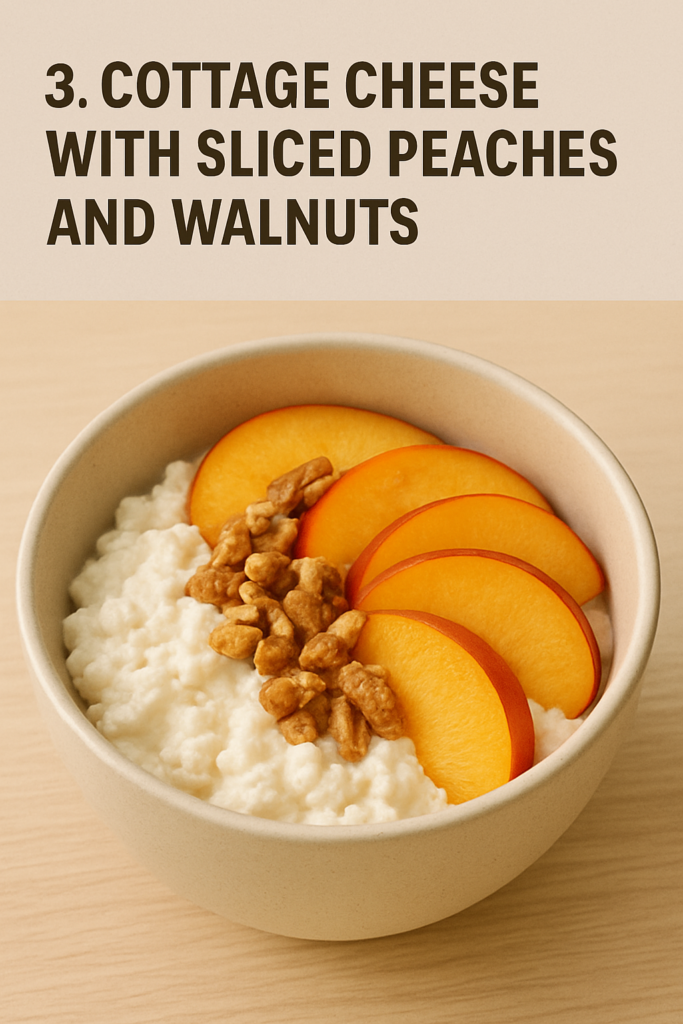
Cottage cheese is an underrated high-protein, low-carb breakfast base that supports blood sugar balance beautifully.
Pairing it with sliced fresh peaches adds natural sweetness and fiber, while a few walnuts bring in healthy fats that slow down glucose absorption.
This combo is refreshing, filling, and perfect if you want something cold and quick.
Look for cottage cheese brands without added sugars or unnecessary thickeners for the best results.
Helpful pick:
Portable insulated bowls help keep dairy-based breakfasts like cottage cheese cold until you’re ready to eat.
🥗 4. Smoked Salmon Wrap with Leafy Greens
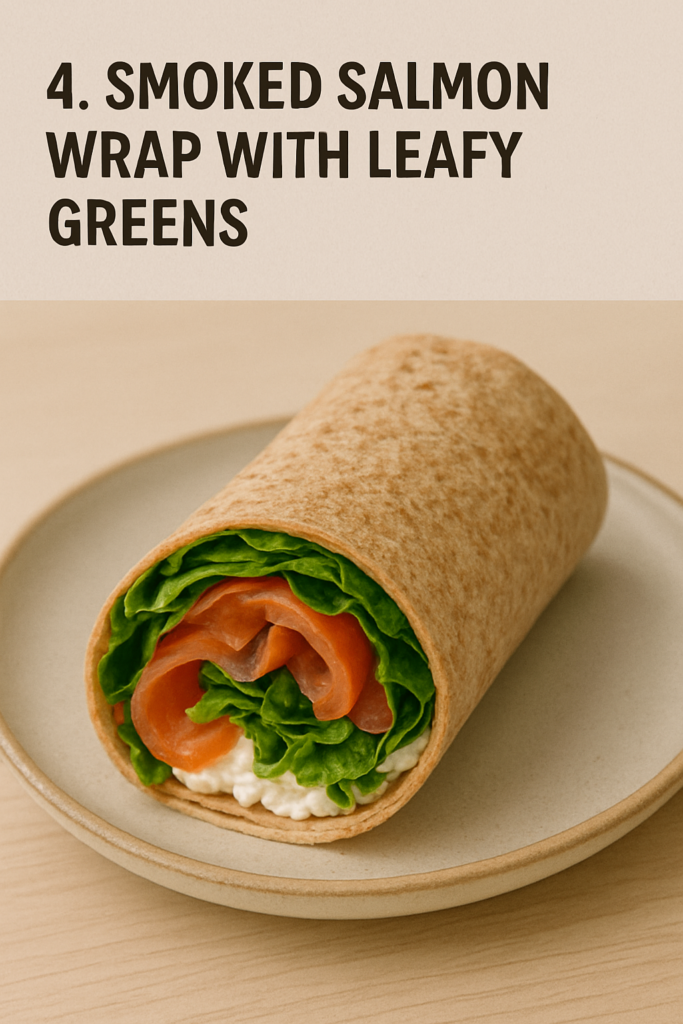
For a more savory, low-carb breakfast, try a smoked salmon wrap.
Use a whole-wheat or low-carb tortilla and load it with smoked salmon, arugula, spinach, or mixed greens.
You can add a smear of cream cheese or a drizzle of olive oil for extra richness and flavor.
Salmon offers anti-inflammatory omega-3 fatty acids, which not only protect your heart but also support blood sugar stability.
Leafy greens add fiber, vitamins, and volume, making you feel satisfied without the crash later.
Helpful pick:
Low-carb, high-fiber wraps are great for building balanced breakfasts that are quick, delicious, and blood-sugar friendly.
📋 Bonus Tips for Building Blood Sugar-Friendly Breakfasts
- Always include at least 15–20 grams of protein at breakfast.
- Choose carbs that are high in fiber and low on the glycemic index.
- Add healthy fats like avocado, nuts, or olive oil to slow digestion.
- Avoid sugary yogurts, cereals, and fruit juices, which can spike blood sugar early and set off cravings all day.
When in doubt, ask yourself:
Does this breakfast have protein, fiber, and healthy fat?
If yes, you’re likely making a blood sugar-friendly choice.
🔥 Small Tweaks = Big Blood Sugar Wins
It’s easy to underestimate how small habits — like sipping coffee before eating — affect blood sugar.
But science shows the first things you do in the morning matter the most.
Here’s your new, easy-to-follow morning routine for better blood sugar:
- Drink water first (bonus: add electrolytes!)
- Eat a small protein-forward meal
- Wait 30-60 minutes, then enjoy your coffee
- Add cinnamon or collagen for bonus support
Over time, these changes can significantly improve your mood, metabolism, energy, and overall health.
🛒 Shop Smart for Your Blood Sugar Morning Essentials
To support your new morning routine, check out:
- Top-rated collagen powder for easy coffee boosts
- Smart temperature-controlled mug to avoid rushed mornings
- Protein powders that mix into smoothies without extra sugar
- Meal prep containers to stay organized and balanced
Choosing the right tools can make it much easier to protect your blood sugar every single day.
- STAINSHIELD PLASTIC: Rubbermaid Brilliance meal prep containers are designed with premium StainShield plastic, and have …
- 100% LEAKPROOF AND AIRTIGHT: Guaranteed not to leak, these airtight food storage containers feature a leakproof seal and…
- TWO COMPARTMENTS FOR EASY MEAL PREP: Rubbermaid Brilliance meal prep containers feature 2 compartments that make preppin…
Don’t Let Your Morning Sabotage Your Blood Sugar
Morning habits shape everything: your energy, cravings, focus, even long-term health risks.
By simply eating before coffee, choosing protein, and supporting your blood sugar naturally, you can reclaim your day — and your health — starting tomorrow.
✅ Try making one small swap this week, and watch what happens to your energy, mood, and appetite!
✅ Your body (and future self) will thank you.
📚 References
At Whole Health Nourishment, we believe that reliable health advice should always be backed by science.
The information in this post is drawn from peer-reviewed studies, leading academic journals, and trusted medical research institutions.
We’ve carefully selected reputable sources to ensure everything you read here is accurate, evidence-based, and practical for real life.
When it comes to your health — and especially important topics like blood sugar — we want you to feel confident that you’re getting advice you can trust.
- Smith HA, et al.
“Drinking coffee first thing in the morning can have a negative effect on blood sugar control”
University of Bath, 2020.
https://www.bath.ac.uk/announcements/drinking-coffee-first-thing-in-the-morning-can-have-a-negative-effect-on-blood-sugar-control/ - Keijzers GB, De Galan BE, Tack CJ, Smits P.
“Caffeine can decrease insulin sensitivity in humans.”
Diabetes Care, 2002.
https://diabetesjournals.org/care/article/25/2/364/21965/Caffeine-Decreases-Insulin-Sensitivity-in - Peters AL.
“Cinnamon as a complementary therapeutic approach for blood sugar control in type 2 diabetes.”
Journal of Diabetes Science and Technology, 2013.
https://journals.sagepub.com/doi/full/10.1177/193229681300700414 - Hlebowicz J, Darwiche G, Björgell O, Almér LO.
“Effect of cinnamon on postprandial blood glucose, gastric emptying, and satiety in healthy subjects.”
The American Journal of Clinical Nutrition, 2007.
https://academic.oup.com/ajcn/article/85/6/1552/4649440 - DeFronzo RA.
“From the Triumvirate to the Ominous Octet: A New Paradigm for the Treatment of Type 2 Diabetes Mellitus.”
Diabetes, 2009.
https://diabetesjournals.org/diabetes/article/58/4/773/12301/From-the-Triumvirate-to-the-Ominous-Octet-A-New - New England Journal of Medicine
“The Effects of Intensive Glucose Lowering in Type 2 Diabetes.”
NEJM, 2008.
https://www.nejm.org/doi/full/10.1056/nejmra1810195
Related Articles:
The Hidden Truth About “Healthy Snacks” You Might Want to Rethink
As an Amazon Associate, I earn from qualifying purchases.















![Wide Mouth Mason Jars 32 oz [4 Pack] With Mason Jar Lids and Band...](https://m.media-amazon.com/images/I/4107pM2hYKL._AC_.jpg)
